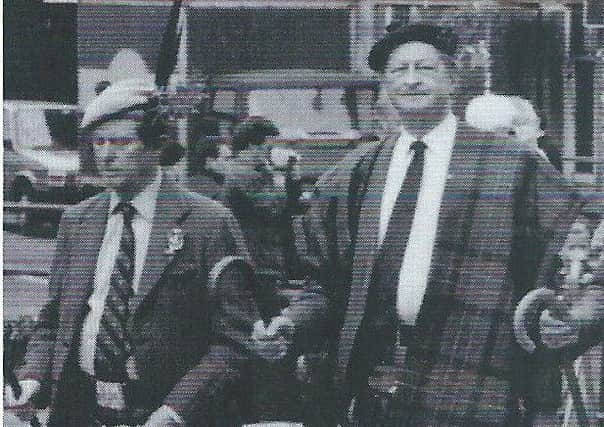Obituary: Angus Nicol, barrister, Gaelic scholar and world authority on bagpiping music


Angus Nicol was a world expert on bagpiping music and lore, and a noted Gaelic scholar. Though not himself a player of the pipes, he knew every detail of the history and development of pipe music, be the subject ceol mor or piobaireachd, and did much research into the origins of tales such as the fairies’ gift of a silver chanter to a piping family of Skye.
Remembered by many as a shy, quizzical figure, given to peering over his glasses, Nicol was nevertheless a stickler for accuracy in the many different intellectual fields in which he excelled, and did not suffer others’ ignorance gladly.
Advertisement
Hide AdAdvertisement
Hide AdHe worked as a barrister in London, but at every opportunity would travel up to Scotland, and was well known at all the main Highland gatherings, his favourite being the Argyllshire Gathering at Oban. This he, told friends, he had attended every year of his life from the age of three in 1936, until 2015. He was twice, in 1983 and 1998, Senior Steward of the Gathering, and also served in other years as piping steward. He often presented awards to winning pipers. One award given each year is the Gold Medal of the Highland Society of London, of which he was Secretary.
In younger days he was a fine Highland dancer, a perfectionist at the Oban balls, and is remembered for his strong views about which version of the Reel of the 51st Highland Division – devised by men taken prisoner in the Second World War – should be adhered to. It is believed he learned it directly from its creators.
His pride in his Scottish origins was great: his family sprang from Kilninver, Argyll, where they had once owned an estate.
The child of divorced parents, Nicol cherished happy memories of sojourns, shooting rabbits and fishing with his grandparents, who still lived there.
In adult life he kept a boat at Ardfern, a few miles from Kilninver, and often stayed with friends in Argyll. A Roman Catholic, he attended Mass in Lochgilphead. He learned Gaelic by regularly attending courses at Sabhal Mor Ostaig on Skye, and thereafter taught the language to classes of his own in London. In 1981 he took issue with MPs’ tactics of talking out the Private Member’s Gaelic Language (Scotland ) Bill introduced by Donald Stewart, SNP MP for the Western Isles.
In 2004 Nicol submitted a learned paper to the Scottish Government at Holyrood about the necessity, as he saw it, of designating Gaelic an official language for Scotland. A meticulous speller of Gaelic, however, he was critical of Scotland’s Gaelic road-signs.
Nicol was President of the London Gaelic Choir, in which he sang and which he also conducted, and and with it won many competitions. At the Oban Mod in 2009 Nicol won the Bardachd competition with three Gaelic poems he had composed himself. He also owned a collection of Gaelic literature, and wrote stories in the language.
He considered entering Scottish politics: he once sought to become Conservative prospective Parliamentary candidate for Inverness, but was not adopted.
Advertisement
Hide AdAdvertisement
Hide AdHe did, however, glory in the title, from 1987, of Chieftain of the Clan MacNicol for all the lands south of the River Tweed.
Angus Sebastian Torquil Eyers Nicol was born in Leamington Spa, Warwickshire, the son of a Scottish father and an English mother. He had a sister, Elspeth, who survives him. He was educated at first by governesses, then at a school in Dorset, before going on to Britannia Royal Naval College, Dartmouth, from the age of 13 in 1947.
He stayed in the Royal Navy until 1956, attaining the rank of Sub-Lieutenant, and serving in the cruiser HMS Euryalus; in Motor Minesweeper (MMS) 1635; in the destroyer HMS Brocklesby, and in the minesweeper HMS Coquette.
He then became Literary Editor at the publishers Cassell & Co, before studying law part-time while working. He was called to the Bar at the Middle Temple in 1963. In 1968 he married Eleanor Denise Brodrick, always known as Denny, whom he met through mutual friends. They would have two daughters, Catharine, always known in the family as “Monster”, and Augusta, always called “Gorg”, short for “Gorgonzola”. Each night he would wish his daughters goodnight in Gaelic.
Nicol and his wife later separated, but did not divorce, and he thereafter lived in a flat in Chelsea when not in Scotland. His wife and daughters survive him.
Nicol dressed in tweed jacket and kilt or trews while attending Highland events, but at work in London as a barrister was seen in pinstriped dark suit, always with a waistcoat. He became a Recorder of the Crown Court, and was one of the chairmen of the VAT Tribunal.
Many judgments of his are regarded as significant, and admirers recall one in particular, in which he dismissed, in a judgment of great elegance, a demand by Customs & Excise to charge VAT on tips to nightclub dancers.
Nicol is remembered as championing old-fashioned ideas, which, friends hope, “will be remembered and live on into the future through his work with Gaelic, piping, and all things Highland”.
Anne Keleny